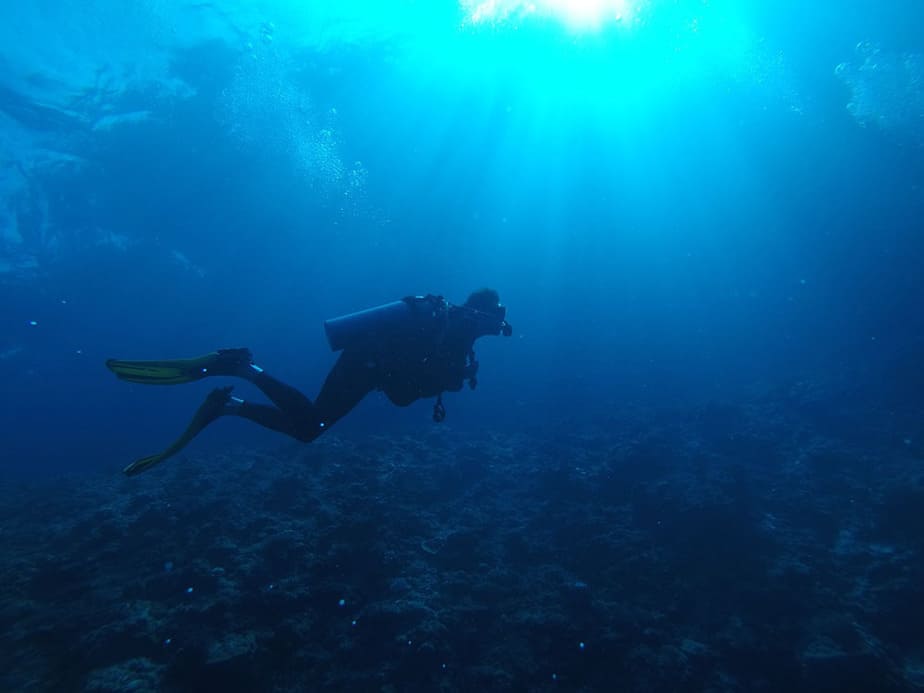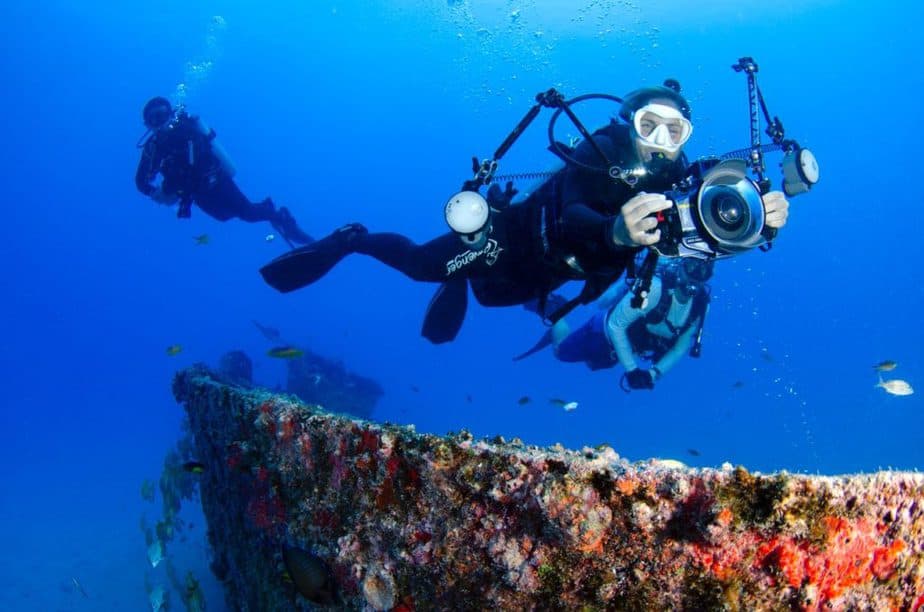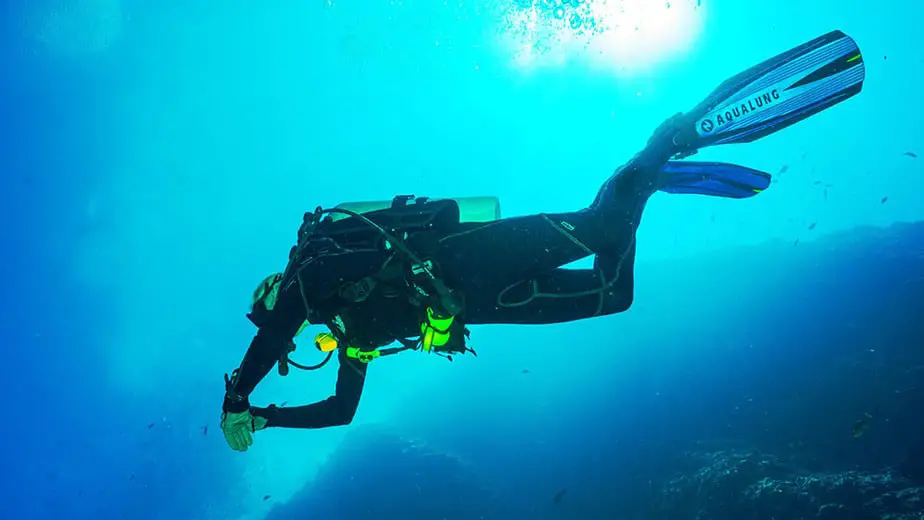Master SCUBA Diver (MSD) and Divemaster (DM) – two titles that sound suspiciously like they are the same thing. After all, both titles contain the words “master” and “diver” which clearly signifies a diver of great skill. Yet, one title is still within the realm of recreational diving, and the other qualifies a diver for professional diving jobs.
Even recreational divers often assume they are one and the same, which is why there is so much confusion for someone looking to move up the ranks. However, each title requires different commitments to achieve. In this article, we will discuss how to qualify for each title, their differences, and help you decide which title is worth it for you.
Master Diver and Divemaster Differences
Everybody starts off their scuba diving careers humbly, with no certification and just a dream to one day be certified. As your skill progresses and you get more certifications under your belt, suddenly you notice that you are reaching the top. What awaits you there?
Master SCUBA Diver
Starting off, what does being a Master SCUBA Diver entail? If it helps, you can think of a Master SCUBA Diver as a black belt of recreational diving, meaning it is the highest level that a rec diver can achieve. This is an exclusive title that fewer than 2% of all scuba divers achieve, making them part of an elite club that should be respected.
There is not a singular course or test to take to become a MSD. It involves significant time and effort where you need to perform a minimum number of 50 logged dives, be Advanced Open Water Diver and Rescue Diver certified, and to complete at least five specialty diving courses (PADI requirements).
Depending on what you take for your five specialty dive courses, those courses may have strict minimum requirements as well. Completion of these requirements means that a diver has vast experience and skill, which is why the title of MSD should be respected.
You do not need to be a Master SCUBA Diver to enjoy recreational scuba diving. In fact, many divers decide to get their MSD certification once they realize they amassed a few certifications over the years and that they are not far off from meeting the requirements. Of course, you can set a goal to be MSD certified from the outset. Or you can try a more casual approach by enrolling in new courses periodically as a result of your personal growth as a diver.
Master SCUBA Diver Requirements
If you are thinking about becoming a Master SCUBA Diver, here are the minimum requirements:
- Be 12 years of age or older (12-14 year olds earn the Junior MSD).
- Be PADI (Junior) Advanced Open Water certified.
- Be PADI (Junior) Rescue Dive certified.
- Earned at least five (5) PADI Specialty Diver Certifications.
- Have a minimum of 50 logged dives.
- Complete the application to be a Master SCUBA Diver.
As you can see, these requirements are tough and requires divers to have significant experience with diving. The core PADI courses should expose divers to a variety of environments and situations. Then, completion of five additional PADI specialty courses will make divers even more well-rounded.
The specialty dive courses will give divers a chance to familiarize themselves with gear they may not have used before, such as a full face mask, sidemount, compass, DSMB’s, lift bags, and nitrox to name a few.
These five specialty courses do not need to be completed in any given order; they are a requirement to give divers the knowledge and skill variation to be versatile and well-rounded. Furthermore, completion of these courses shows a level of dedication to the sport and is an investment in oneself. For this reason, Master SCUBA Divers receive recognition as the top rank of recreational divers.
The biggest distinction between a Master SCUBA Diver and a Divemaster is this: MSDs are the highest level a recreational diver can achieve; Divemasters are in the realm of professional diving.
Divemaster

The main reason most divers would want to be a Divemaster is to earn a professional rating to qualify for paid work in the diving industry. Of course, some divers want to have the distinction of being a Divemaster just for the fun of it. Others who are not this fanatical about scuba diving can be content with a Master SCUBA Diver rank which is quite respectable already.
Another reason for one to become Divemaster certified is to become a SCUBA Instructor. The exercises learned as part of the Divemaster course require increased supervisory skills, logical awareness, and responsibility of others which are crucial if one wants to progress to the instructional side.
As a Divemaster, you can become an assistant instructor and officially bridge the gap between recreational and professional diving. As an assistant instructor, one can only help out in the instruction of scuba courses under a fully-fledged scuba instructor. A scuba instructor, on the other hand, can teach courses alone.
Some of the responsibilities of being an assistant instructor include watching over other divers on outings and running a number of programs themselves to take some of the burden from the instructor. What they can teach are certain specialty courses such as the Reactivate refresher course and the Discover Scuba Diving (DSD) course, after they themselves have received the proper training.
Divemaster Requirements
If you are thinking about becoming a Divemaster, here are the minimum requirements:
- Be 18 years of age or older.
- Be PADI Advanced Open Water Diver certified.
- Be PADI Rescue Diver certified.
- Have a minimum of 40 logged dives.
- Completed EFR Primary and Secondary Training within the last 24 months.
- Be medically cleared for diving by a physician within the last 12 months.
To achieve the Divemaster certification, a trainee must meet all of the requirements above to be eligible for the Divemaster course. Each requirement is designed to increase one’s diving abilities, supervision techniques, and knowledge of the PADI system. They also give trainees some hands-on experience with Divemaster duties and functions by participating in real courses, though mock-ups may be used in the absence of students.
A major distinction between a Master SCUBA Diver and a Divemaster is that you are now looking out for others’ safety, not just your own. A Divemaster’s goal is to ensure all divers should have a great time and an amazing diving experience while also maintaining high safety standards. They operate on a philosophy of dedication, hard work, responsibility, and professionalism. For this reason, Divemasters are greatly respected in the diving community.
Becoming a Divemaster requires a tremendous amount of effort and dedication. If you feel this is too high of an ambition, or that the requirements are not necessarily something you care for, then consider pursuing a Master SCUBA Diver certification or some other specialty such as the PADI Self-Reliant Diver if you are interested in solo diving.
Is It Worth It To Be A Master SCUBA Diver (MSD)?
A Master SCUBA Diver is the highest level a recreational scuba diver can achieve. Only a select few divers have completed the requirements and completed a request to be a MSD. Since it is not a professional title, it means you are not yet qualified for any paid diving jobs.
However, having this title signifies that the diver has more training and experience than the typical diver. A Master SCUBA Diver may be privy to PADI promotions that are normally reserved for professionals. They may also receive exclusive offers on services like PADI Travel so it does have some practical perks as well.
As for whether it is worth it to be a Master SCUBA Diver, since it is not a professional title you will not “earn back your investment”, at least financially. However, it’s worth it if you like having more clout in the diving community. Some diving enthusiasts set themselves a goal to be a Master Diver from the outset, and the journey to become one can be a greatly rewarding experience. You do not have to be a Master Diver to enjoy recreational diving, however it is something you can earn as part of your personal growth in which case it is worth it.
Is It Worth It To Be A Divemaster (DM)?
 A Divemaster is a step up even from a Master SCUBA Diver. To become a Divemaster is to bridge the gap between recreational and professional diving. Being Divemaster certified qualifies you for various paid jobs in the diving industry. Even fewer people are Divemasters than Master Divers, and it is a respectable title to have.
A Divemaster is a step up even from a Master SCUBA Diver. To become a Divemaster is to bridge the gap between recreational and professional diving. Being Divemaster certified qualifies you for various paid jobs in the diving industry. Even fewer people are Divemasters than Master Divers, and it is a respectable title to have.
It is much more “worth it” to be a Divemaster both from a personal standpoint and a financial one. You can decide to be a Divemaster simply because it is rewarding for you to get more certifications under your belt. There’s no reason why a Master SCUBA Diver has to be the stopping point.
From a financial standpoint, a Divemaster can become an assistant instructor and can eventually become a full-fledged scuba instructor. There are many other employment opportunities outside of teaching, such as underwater photographer/videographer, scientific diver, marine archaeology, public safety diver, and commercial diver. You can even work in a dive center; whether that means helping out with the shop, boat or underwater. Being a certified DM opens many opportunities in the diving industry.
Master SCUBA Diver or Divemaster?
Despite these titles sounding so similar, there are actually significant differences in responsibility being a Master SCUBA Diver vs Divemaster. Even though Divemaster is technically the higher title, one is not necessarily “better” than the other depending on what you want out of your training. Both titles are highly respected in the diving community, however being a Divemaster allows you to make a career out of diving.
If you are aiming to increase your diving skills by taking specialty diving courses, you may inadvertently make yourself eligible for a Master SCUBA Diver certification. Or perhaps it can be your to be a Master Diver from the outset. Either way, achieving this title is a significant accomplishment.
If you see yourself having a career as a diver, then you must aim to be a Divemaster. Then, you can get paid to assist and guide others as an instructor, or perhaps you want to take on a commercial diving job. Many doors open for you when you complete your Divemaster training.
Whether you decide to be a Master Diver or a Divemaster, it shows that you are a diver with great initiative and dedication. You will also be improving your diving skills which is never a bad thing. If you are thinking about taking your diving to the next level, even as a recreational diver, then consider becoming a Master SCUBA Diver, or a Divemaster if you would like to become a professional diver. The various scuba diving certification agencies all offer courses to help you advance the ranks so that you can eventually reach the top.

